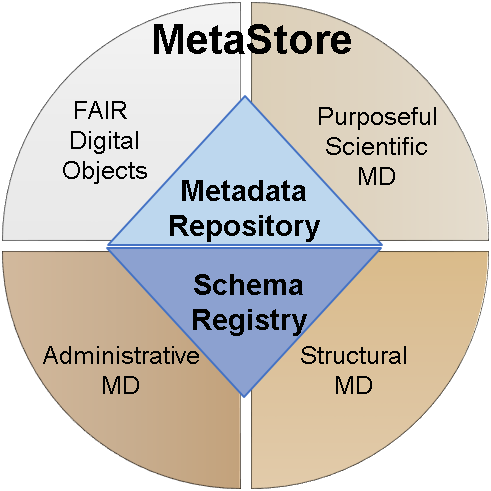Logo

Detailed description of the service
Service’s Capabilities:
MetaStore is a metadata repository that greatly simplifies the management of large volumes of metadata documents. Metadata documents are registered and given a unique identifier, formally checked for correctness and persistently stored. Furthermore, the stored metadata documents can be versioned, retrieved and searched via machine-actionable RESTful interfaces. By assigning PIDs, metadata documents can be prepared for FAIR principles.
The structure of each metadata document is formally described by a schema. The internal schema registry manages the metadata schemas (currently XML and JSON) by registering new schemas, persistently storing and, versioning them as well as granting access to stored schemas. In MetaStore, all metadata documents are associated with a registered metadata schema. During ingest, all metadata documents are formally quality checked by validating them against a schema.
Added Value for the User:
• Low-threshold access due to simple web user interface.
• Versioning (history) of metadata and schema documents.
• Search inside metadata documents with facets.
• Easy to share (meta)data with others.
Services’s Suitability:
The service is suitable for researchers, developers to manage metadata documents based on XML or JSON schemata.
Typical Use Cases:
• A research group wants to grant the validity of their metadata documents.
• A researcher wants to share their metadata documents inside/outside their research group.
• Multiple researchers want to edit the same metadata document and track its changes.
• A researcher wants to reference metadata documents in their paper.
Strengths of the Service:
• Ensure the validity of metadata documents in accordance with the specified schema.
Weaknesses of the Service:
• AAI is not available yet!
• No support for JSON-LD
Terms of use & restrictions
Contact
Volker Hartmann, volker.hartmann@kit.edu
References
publications that reference (or report on using) the service
#WhyNFDI
Miscellaneous
- Source Code Repository: https://github.com/kit-data-manager/metastore2
- Source Code Frontend: https://github.com/kit-data-manager/frontend-collection
- Webpage: https://kit-data-manager.github.io/webpage/metastore/index.html